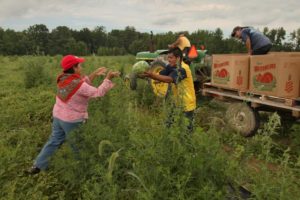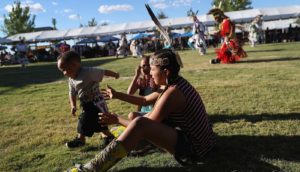About 34,000 people thought to be eligible for compensation, including those born in church-run homes
Ireland has confronted one of the most painful chapters in its history and agreed an €800m compensation package to thousands of unmarried mothers shunned by society and hidden away in church-run mother and baby homes.
The redress scheme was agreed by the government cabinet on Tuesday and will offer up to €65,000 each to survivors of a practice, widely condemned as a shameful and cruel, that spanned almost 80 years of the country’s 100-year history.
Announcing the scheme, the children and equality minister, Roderic O’Gorman, said: “There is no payment or measure that can ever fully compensate or atone for the harm done through the mother and baby institutions.
“What we have set out today is the next chapter in the state’s response to the legacy of those institutions, and its commitment to rebuilding the trust it so grievously shattered.”
The state will also offer compensation to the children who ended up spending their early years in the religious institutions, some of them forced to work in laundries.
Mothers who spent less than three months in a home will be eligible for €5,000, with double that for those who spent between three and six months behind closed doors.
Those who spent more than 10 years in a home can apply for compensation of up to €65,000.
Those born in the homes, who have not previously received compensation from the residential institutions redress scheme, will be eligible for compensation through a separate scheme offering between €1,500 and €60,000 for those who were forced into work.
The government said about 34,000 survivors in Ireland and abroad would be eligible in “the largest scheme of its type in the history of the state”.
The redress scheme comes after an inquiry by the Mother and Baby Homes Commission of Investigation detailed the horrific experiences of about 56,000 women and about 57,000 children who were placed or born in homes, mostly run by nuns, between 1922 and 1998.
In its report published in January it discovered an alarming number of deaths of babies in the homes and documented the cruelty and neglect suffered. Many were forced to take part in work and separated from their babies, who were fostered or adopted.
The commission was established after human remains were found in a mass unmarked grave near a home in Tuam, county Galway.
Catherine Corless, a local historian, had begun studying the records of the home and discovered that 796 children had died there between 1925 and 1961 but there were no burial records.
After excavation, 20 underground chambers were discovered with human remains in at least 17 of them, and age-at-death put at between 35 foetal weeks and two or three years old.
Legislation to allow for the exhumation, identification and reburial of the bodies is going through the Dáil.
“We are progressing legislation to enable access to birth certificates and early life information, and to allow for interventions at the site in Tuam,” said O’Gorman.




